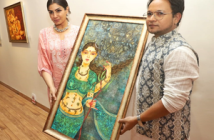By Akshay Acharya
Mumbai, May 2 (IANS) Music is one of the most powerful tools to travel back in time and refresh the memories that hold a special place in your heart. Picture this, it’s summer time in 2007, the window AC is exhaling an icy breeze like the Night King from ‘Game of Thrones’ while the afternoon sun obliterates everything outside your house, you’ve just had your lunch and ‘Laree Chootee’ from the Abhay Deol-starrer ‘Ek Chalis Ki Last Local’ is playing on a music channel and there isn’t a worry in the world for you.
Brings a barrage of memories, doesn’t it?
It was the era of good music playing across the Indian mainstream as opposed to the current times when barring a few exceptions, all you hear are singers setting their voices to melodyne or auto-tune, and composers heavily synthesising their melodies to make it “audience friendly”.
However, true art and artistic integrity always make their way around as they transcend the boundaries of space and time, and Zulfiqar Jabbar Khan, professionally known as Xulfi, is a true testament of this fact.
Xulfi is the lead singer of the Pakistani band ‘Call’ and is the one who sang ‘Laree Chootee’ and even featured in its music video which cross-cuts between two worlds of ‘Call’ performing for the screen and Abhay and Neha Dhupia dancing to the tune.
While in India, the larger audience may remember him for just ‘Laree Chootee’, across the border, Xulfi has been working towards building a better ecosystem for music by nurturing new talents and setting up new benchmarks for the fresh talent to cross. The result? Pakistan has been consistently coming up with good melodies both in mainstream and off-beat music because fresh ideas and perspectives are being encouraged and recognised.
Xulfi started his career in 1994, three years before Junoon’s ‘Sayonee’ landed on the ears of music lovers and changed the landscape of Sufi rock music both in India and its neighbour. His first band was Paradigm which he formed in college, his bandmate – a Pakistani film and television star who has girls swooning over him – Fawad Khan.
Soon the two started performing with their band and one day met Ahmed Ali Butt of Entity band and formed Entity Paradigm in which Xulfi swung between the roles of a composer, music producer and guitarist. However, what changed his life as a musician was an accident – the one where he slipped and fell during his college, resulting in a slipped disk and a bulge in his back, which demanded a bedrest of 2 months from him.
Unable to move around, he asked his computer table to be moved close to him during the rest period. He spent the next two months on his computer toying around with sounds and his digital audio workstation before he created an entire instrumental album on his computer without using a single live instrument. The album was titled aThe Lifeless Journey’.
Over the next few years, Xulfi participated in competitive music shows where he learnt the ropes of music production and slowly set his foot in the bigger aspect of the music industry – giving a definitive shape to a composer’s abstract melody using studio techniques and softwares. After completing his graduation, he asked his parents to let him consider a career in music for one year, to see if he could make it.
He set up a very basic studio in his mother’s clinic that was attached to the main house. Xulfi told ‘Dawn’, “It was a chhota tareen [the tiniest]studio, but the first album that I recorded was Jal’s aAadat’. It was at a time when Atif (Aslam) and Gohar (Mumtaz) had separated and Atif was recording his album in Islamabad. So, we had to come up with an album as quickly as possible, as Jal”.
‘Jal’ was a new band at the time and it changed the tides for music both in India and Pakistan. As much as Jal’s ‘Aadat’ was loved by Indians in its original version, it was remade into several versions with new elements, as ‘Bikhra Hoon Main’, and for the eponymous track from the 2005 Bollywood film ‘Kalyug’ directed by Mohit Suri of ‘Aashiqui 2′ fame, and received equal love from the audience as the melody found a better distribution system in India ably supported by the Bollywood muscle. The melody was also ripped off by Indian music composer Pritam for the track aZahreeli Raatein’ from the Vivek Agnihotri directorial ‘Chocolate’.
Remember this was the era of 2G and content was shared through bluetooth, an unregulated system, which led to an uptick in piracy.
Two years after the shockwave of ‘Aadat’ settled, Xulfi once again appeared in India in ‘Laree Chootee’ video. This time, he made sure not to deliver a breakout hit but a timeless melody. Sixteen years after its release, the song has countless reels to its credit with many users on the Internet saying that the quality of the video may be 144p but the music is pure gold.
The success of ‘Laree Chootee’ can be understood from the fact that a part of Pritam’s charbuster track ‘Kesariya’, from the Ranbir Kapoor, Alia Bhatt and Amitabh Bachchan-starrer ‘Brahmastra’, is oddly similar to the song. The part, ‘Rabba ne tujhko banane mein kar di hain husn ki khaali tijoriyan’ sung by Arijit in the song is exactly the same as the hook of ‘Laree Chootee’.
Xulfi also served as the music producer of the Pakistani music television series ‘Nescafe Basement’ from season 1 to season 5 where he also mentored emerging talents on the show and projected the torchlight on the underground music scene of Pakistan. He helped form the first-ever all-girl band in Pakistan on the show along with an all-kids band.
He has had successful collaborations with other global brands like Coca-Cola and Pepsi, the two soft-drink giants that don’t see eye to eye (no pun intended to Xulfi’s fellow Pakistani musician Taher Shah’s sensational track ‘Eye to Eye’) found a common ground in an artiste. While he reunited with Entity Paradigm for ‘Pepsi Battle of the Bands’, he delivered the chartbuster track ‘Pasoori’ as a part of Coke Studio Pakistan Season 14 on which he served as the producer and music composer.
‘Pasoori’, a song first conceptualised by Ali Sethi, spoke about acceptance and embracing the artiste in all of us. It came to him after the cross-border cultural ties between India and Pakistan were severed. It was given a definitive form by Xulfi. The song once again struck a chord with people in India and also landed as a score on the end credits of the streaming mini-series aMs. Marvel’, bringing in global recognition as well.
‘Pasoori’ crossed 100 million views on YouTube in three months of its release, a mark which took several years for the gem of a track like ‘Tajdar-e-Haram’ took years to cross. The song currently stands at 565 million views on YouTube.
He also composed another chartbuster track from ‘Coke Studio Pakistan’ season 14 – ‘Tu Jhoom’ featuring the veterans Abida Parveen and Naseebo Lal for the purists who revel in a more serious kind of music.
He also covered sports through his music as he composed and produced the official PSL Anthem named ‘Tayyar Hain’, which featured Haroon, Asim Azhar, Ali Azmat, and Arif Lohar, for the 5th edition of Pakistan Super League.
The producer-composer is not just on the creative side of things but is also strengthening the piers of the superstructure of Pakistani music through SYNC, a tech company that he co-founded which specialises in lasers, lights, motion triggers, Led suits, MIDI triggered moving heads for live shows.
From nurturing young talents, to encouraging the underground music, to bringing gold standard content consistently for the Pakistani music industry, to working towards live music, the man covers all aspects of music with skies of global recognition, the groundwork of production and the depths of underground.
Xulfi was a legend then, he is a legend now.
–IANS
aa/svn/





